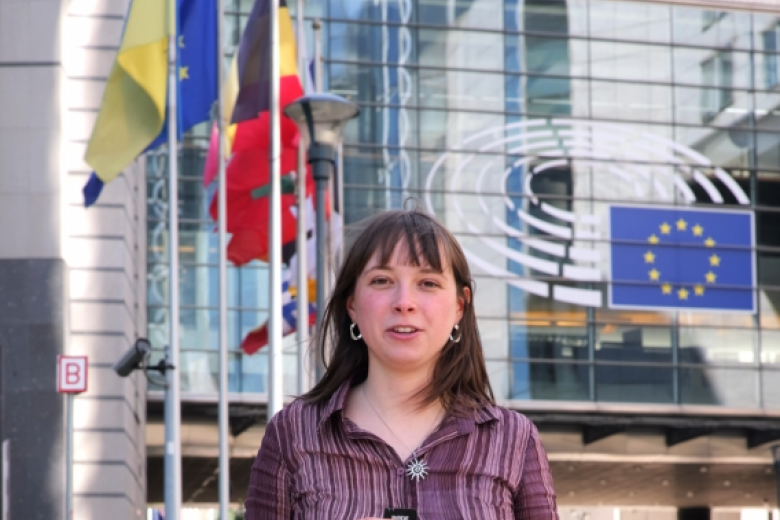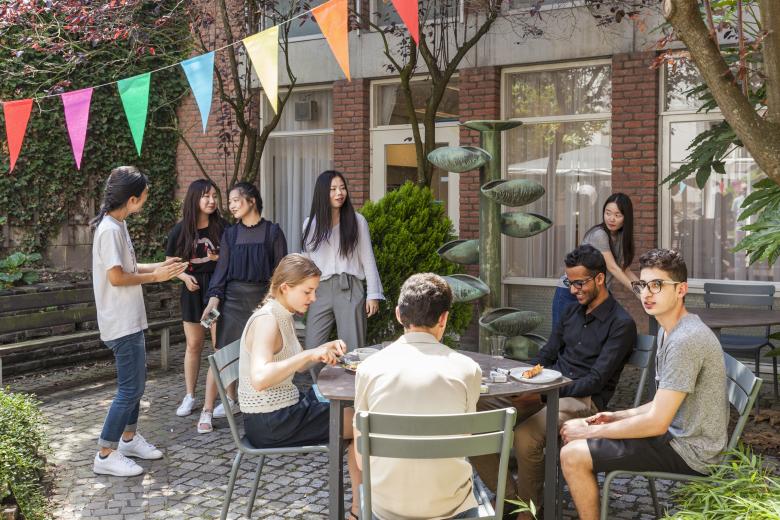The Foundation Programme: laying a foundation for your studies in Maastricht
When you have completed your secondary school education in a non-EU country, the opportunity to attend university in Maastricht is naturally quite exciting. The only catch is that your diploma may not meet the requirements in the Netherlands (or the 45 other nations who signed the Bologna Convention), which is why Maastricht University is offering the Foundation Programme. Here you will spend a year in intense preparation for your studies in Maastricht, covering everything from language mastery to academic skills. It also guarantees your advance acceptance to a number of our bachelor's programmes.
Joris van Poecke is the programme manager for the Foundation Programme. 'About twelve years ago, we started a programme to prepare Saudi-Arabian students who’d earned a King Abdullah Scholarship to study medicine here in Maastricht. Through those efforts, we gained a great deal of experience in training students from other countries and other cultures'. At his suggestion, the decision was made a few years ago to offer a preparation programme for other bachelor's programmes as well and to expand access to students from other countries. The result was the Foundation Programme.
Admission to the bachelor's programme
In fact, the Foundation Programme serves as pre-academic training and university entrance examination (colloquium doctum) in one. Before students begin the Foundation Programme, an evaluation is made as to whether they can move on to the UM bachelor's programme of their choice after completing the programme. 'If they finish the year with good results, thereby meeting the stated requirements for admission, they are automatically accepted for enrolment in a number of bachelor’s programmes. They will, of course, need to enrol on their own'. Joris van Poecke and his colleagues read the cover letters, provide feedback and make sure students are aware of the deadlines.
'If participants do not complete the Foundation Programme successfully, or fail to gain admission to a bachelor's programme, we look into whether Zuyd University of Applied Sciences might be a good alternative and if there’s a place for them there. If that doesn't work out, they usually return home to attend university in their own country.'
An intensive year
Participation in the Foundation Programme is intensive. According to Caroline Huijts, it’s 'much more school-like' than the first year of a bachelor's programme. Huijts teaches skills training, among other things, and also works as a recruiter. 'We prepare participants for Maastricht’s brand of problem-based learning, and apply it as much as possible in this stage as well. The students take language lessons in four different groups. They’re assigned to these groups based on their individual level. Students with a lower level of language skills will receive more hours of teaching than those who come in at a higher level.'
'The students also receive several hours of academic skills training each week. This includes learning to summarise information, take notes, structure an argument and take part in a debate. They may spend more hours in the classroom than the average bachelor’s student, but it’s fewer hours than at a secondary school. They receive approximately 16 hours of instruction per week, along with hours of self-study, their study load is around 40 hours per week.'
'We offer ten different skills-training modules, all of which they must successfully complete", Joris van Poecke adds."The students meet deadlines and hand in their homework – and if they don’t, they must complete the make-up assignments. They are also given marks for their attitude in the tutorials and their study mentality. In other words, it’s all very structured. And they learn a lot from that. There is an interim and a final exam, sometimes in the form of a paper or a special assignment like giving a presentation or poster presentation.
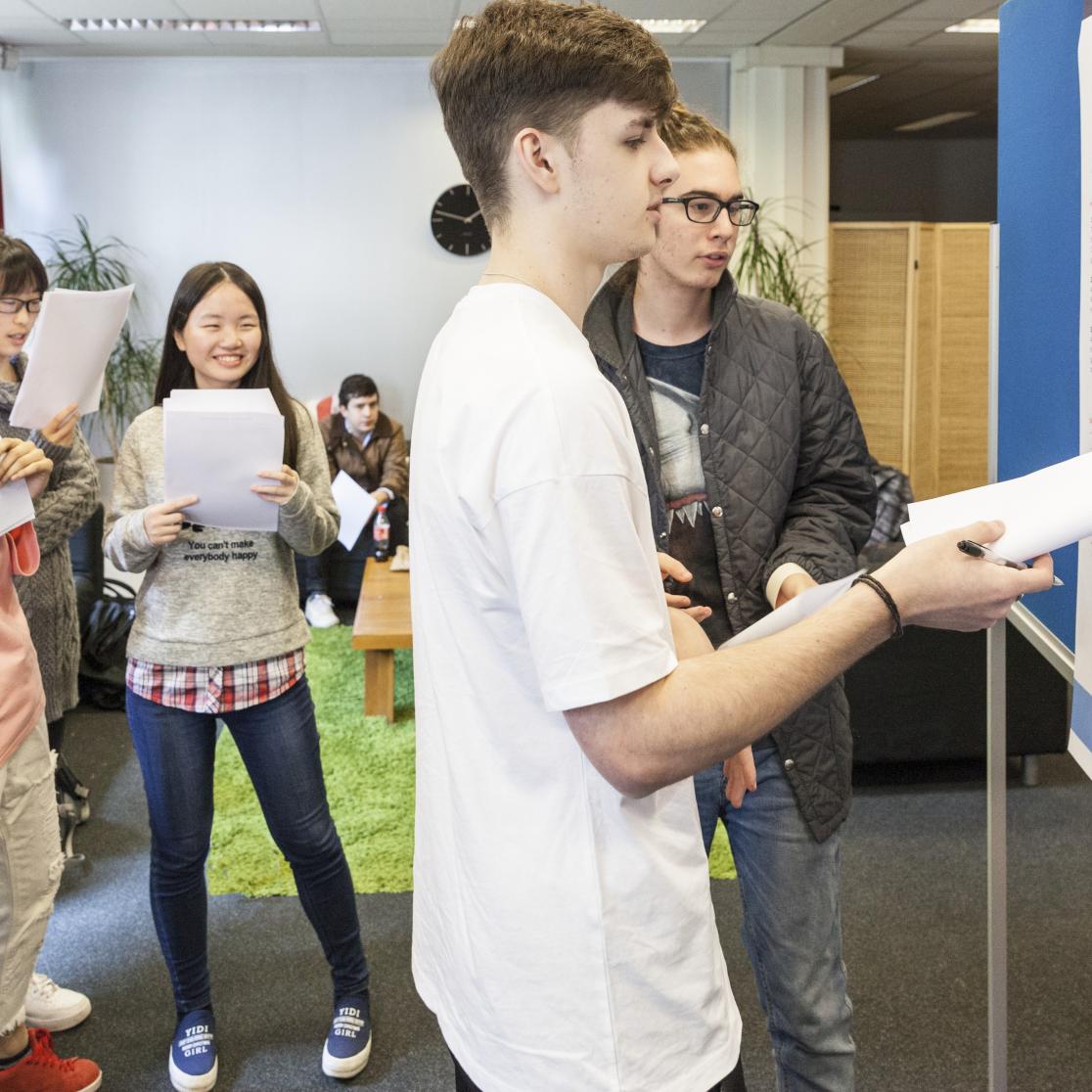
Watch the video and find out how students experience the Foundation Programme.
Students receive effective guidance
'They meet with their academic adviser a few times a year to discuss their marks, study mentality and attendance', says Caroline Huijts. In addition to the academic adviser, students are also assigned a mentor. 'Mentors are usually students from University College Maastricht. Not only do they organise social activities, like group dinners or a visit to the Christmas market, they also assist with practical matters. Is the student able to find housing? Are they having trouble registering with the municipal authorities? It's up to each student whether they participate or not.
The main thing is to 'learn by doing', as Joris van Poecke knows from experience. 'We assume that most of the students are in for a bit of culture shock. When they run into that with us, the stakes aren't usually so high yet and we are able to help them in all kinds of ways. At the end of the day, though, they need to pass all their classes. Simple as that. Each and every one of them must meet the same requirements'. The average age of the students is 19. While some are straight out of secondary school, other students have held jobs for a few years in order to save money, with the goal of taking part in the Foundation Programme.
Sound knowledge of the English language
Students hoping to take part must first score at least a 5.5 on the IELTS test – the International English Language Testing System. The language skill levels of students in the Foundation Programme can vary quite widely, and the language classes have been tailored to reflect this.
Benefits of the UM Foundation Programme
'The major benefit is that it's a programme by and for UM specifically', says Joris van Poecke. 'Maastricht University is the only Dutch university to have developed its own Foundation Programme'. Maastricht has other advantages to offer as well, such as its safe and small-scale setting. The city's cultural offerings have seen enormous growth, as have its sport facilities. 'People often consider it a plus that, if asked for, we have close contact with the parents of our students before they apply', Caroline Huijts explains. 'Many parents spend a few days in Maastricht, gathering all the information they need, before signing their children up for the Foundation Programme. They're quite pleased to hear that we have plenty of experience with young international students. Afterwards, they often express relief at having been able to see and hear what we offer for themselves.'
Living on your own
The Foundation Programme participants don’t live on a campus or in a Guesthouse: instead, they must find their own rooms. Caroline Huijts explains that they are properly informed of this in advance. 'Because the programme is so small, we have lots of contact with the students before they arrive in Maastricht. We send them information about Maastricht Housing and other room-letting agencies during the summer.' Joris van Poecke adds: 'Once they actually live and study here, they more or less organically create a network for themselves. We try to encourage this by pairing certain students with one another. Those who are really good in English language or maths, for instance, are matched with students who are weaker in those areas.' And finding a room to rent? 'There's no shortage of student rooms here in Maastricht, so finding one is never an issue', he concludes reassuringly.
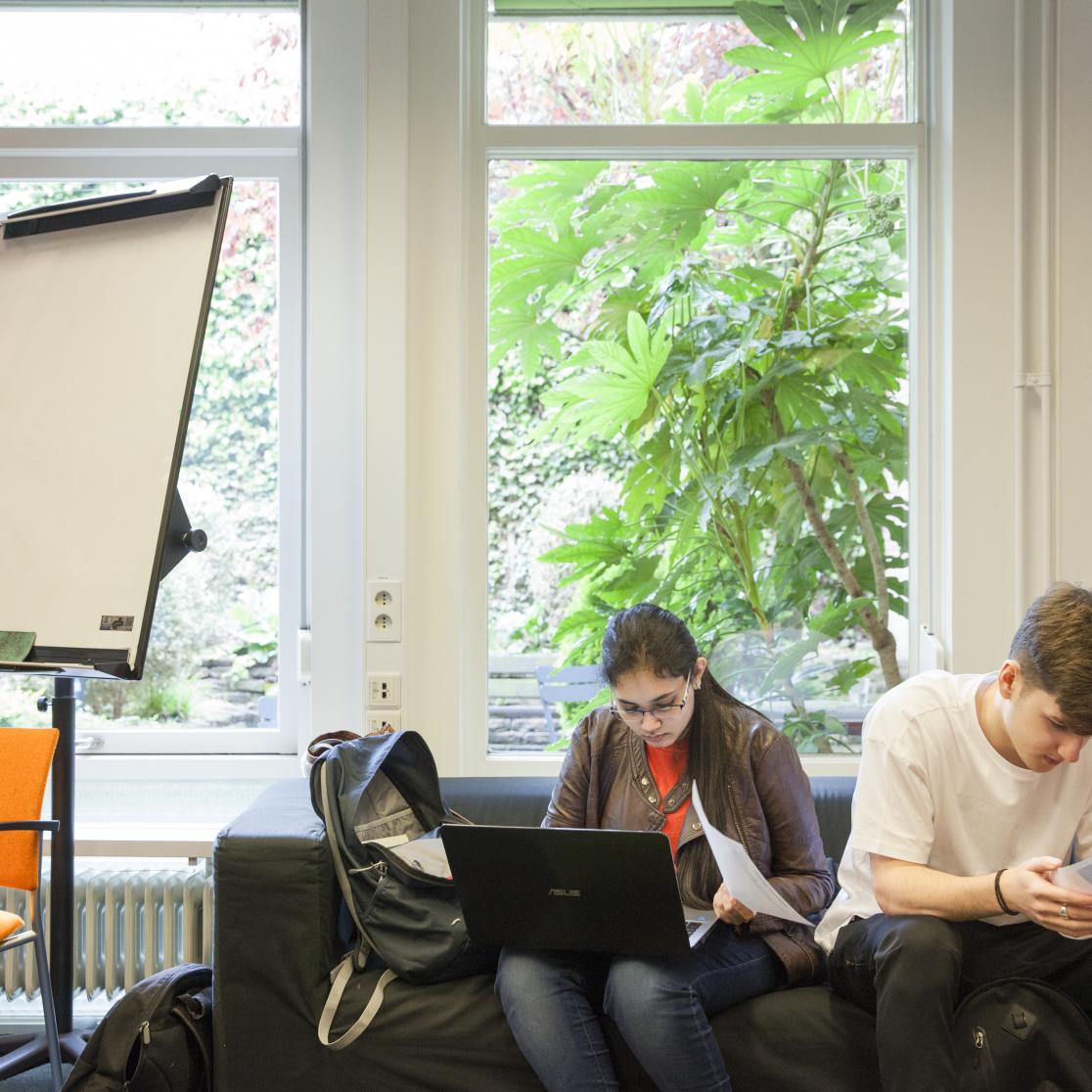
“We all took the same classes in the beginning of the programme, including: European History, Skills, Mathematics, and Research Methodology and each class prepared us for our Bachelor study in a different way. The Skills class prepared me for University study techniques. We had to practice writing essays using the Maastricht University criteria which I found really helpful because I now know what teachers expect me to include.
It also taught me some study techniques, like speed-reading, that are essential for my time at University. I also had to take an Economics class and what I learned in this class was even comparable to what I studied as an International Business student later on."
Fidelia Ikli Shufa, Indonesia
"I greatly enjoyed the Foundation Programme. It was an amazing journey that strengthened my academic and social skills. The Problem-Based Learning system prepared me well for my current bachelor’s programme. The studying experience enabled me to secure an International Business scholarship.
I would definitely recommend the Foundation Programme to students seeking the right academic skills prior to a bachelor’s study!"
Dan Yang, China
"I would say the Foundation Programme prepares you well for what to expect living and studying in Maastricht. The social program introduced us to the mentors who guided us around town, we explored new friendships and I shared moments with people from different countries; the festive “Sinterklaas” party, with drinks, food, and of course, presents!
The Ferris wheels, and warm “poffertjes” with powdered sugar at the Christmas market helped dampen the home sickness, I admit I sometimes felt. The summer BBQ, towards the end of the Foundation program, was a bitter-sweet moment as you knew that you would soon leave this cosy family."
Pim Vliegen, Thailand-Belgium
Also read
-
Where Law Meets Pop Culture: A Creative Space for Exploration
From hip-hop to Victor Hugo, and historical fiction to classic cinema: What do these things have in common with the study of law, you might think? At Maastricht University’s Faculty of Law, a growing group of researchers and students is exploring exactly that and even more.
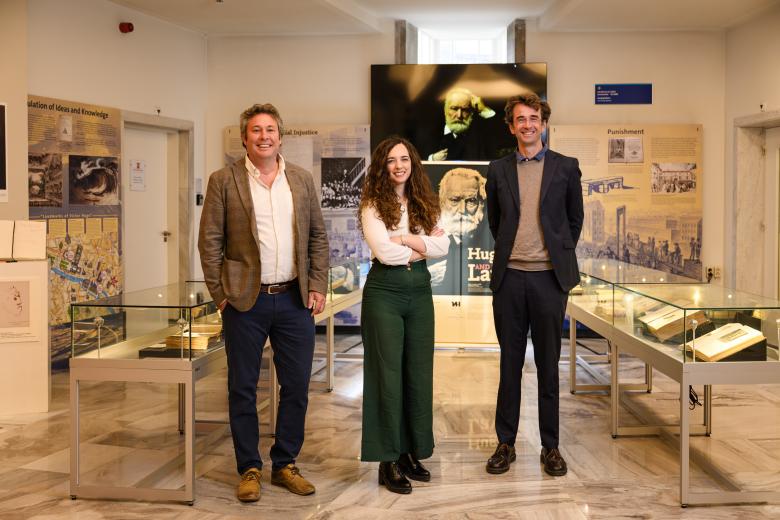
-
Innovative Education in Personal and Family Law
Thanks to the SURF Incentive Scheme for Open and Online Education (still available at the time), Gwen Noteborn (university lecturer in personal and family law at Maastricht University), Claudia Hocks and Janneke Hendrix (lecturers in law at Zuyd University of Applied Sciences) were able to get...
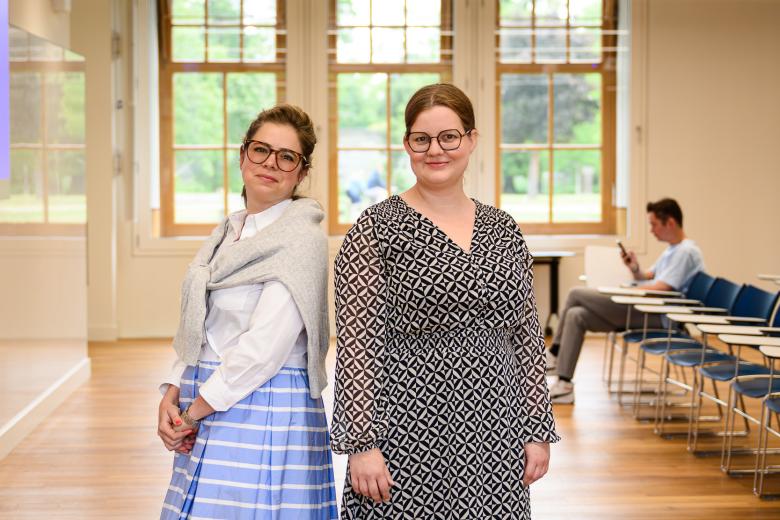
-
Europe Day
To celebrate Europe Day on 9 May, FASoS student Lisa travelled to Brussels to meet with five of our inspiring alumni who are currently shaping European policy and advocacy. In this video, they share why Europe Day matters, how it’s celebrated in Brussels, and what the idea of Europe means to them.
